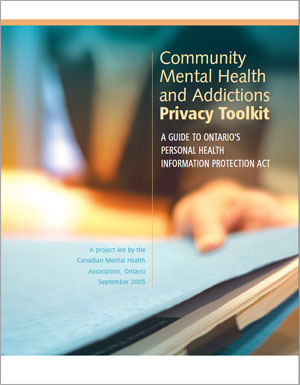 The Canadian Mental Health Association (CMHA), Ontario, is pleased to present “Community Mental Health and Addictions Privacy Toolkit: A Guide to Ontario’s Personal Health Information Protection Act.” This resource was developed to support community-based mental health and addiction service providers in meeting the requirements of the Personal Health Information Protection Act (PHIPA), which came into effect on November 1, 2004.
The Canadian Mental Health Association (CMHA), Ontario, is pleased to present “Community Mental Health and Addictions Privacy Toolkit: A Guide to Ontario’s Personal Health Information Protection Act.” This resource was developed to support community-based mental health and addiction service providers in meeting the requirements of the Personal Health Information Protection Act (PHIPA), which came into effect on November 1, 2004.
As well as explaining the new legislation, the toolkit provides templates which allow service providers to meet the requirements it sets out. There are also scenario-based question-and-answer sections which help illustrate how the legislation applies to our specific sector. The information is presented in a clear, user-friendly format, and we hope that it conveys a complete picture of how PHIPA will impact the work of community-based mental health and addiction service providers.
The toolkit was developed by Mary Jane Dykeman, a lawyer with extensive experience in the field. She was supported in her work by an outstanding advisory committee with broad representation across the sector; the members of the committee are listed in the toolkit itself. On behalf of CMHA, Ontario, my thanks go to both Mary Jane and the advisory committee for their hard work in creating an excellent product.
The toolkit was funded by the Ministry of Health and Long-Term Care to address a need identified by community-based mental health and addiction service providers. CMHA would like to applaud the Ministry’s responsiveness in this project and recognize the support of key staff, including Halyna Perun, Michele Sanborn and Ruth Stoddart. Their participation ensured that the final product is comprehensive and accessible.
For more information, visit the Office of the Information and Privacy Commission of Ontario.
Download the complete Community Mental Health and Addictions Privacy Toolkit (PDF)
Publication date: September 2005